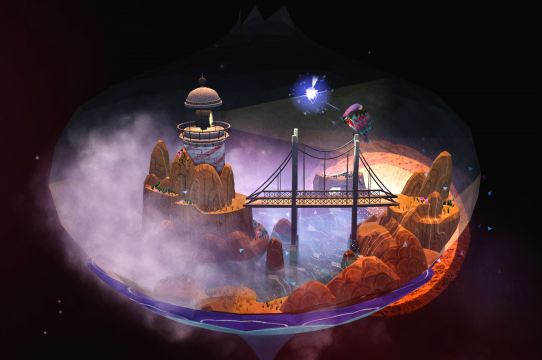with micha cárdenas, A.M. Darke, Robin Hunicke, Susana Ruiz, Elizabeth Swensen, and Noah Wardrip-Fruin
Over the last 40 years we have seen a blossoming of new models of play. From the rise of the New Games movement and the role-playing game genre (in the 1970s) to the current moment’s rise of autobiographical, political and independent art games on increasingly democratized platforms, to the emerging capabilities of augmented, virtual and mixed reality platforms — we are changing who plays, how we play, and what play can mean.
This project group invites those who want to invent and explore new play spaces. It seeks participants who will take play-oriented approaches to storytelling, ideology, sociality, performance, civic participation and other rich areas of human life. The goal is to find those who have their own talents and approaches, but who also desire meaningful collaboration. Ideal candidates will have backgrounds that are already interdisciplinary, especially including two or more of: game design & game creation, documentary practice, creative writing, computer science, digital arts, other arts, and game studies.
Students in the project group will take three courses, with a selection of the instructors listed above. Each of these courses is described below and will involve the creation of a different game prototype, producing a wide range of vibrant ideas from the project group’s activity. We believe a likely model is that one of these projects will be brought to completion as (part of) each student’s thesis work, and that students will each choose as a primary advisor one of the faculty with whom they take a course (with the other faculty likely to play roles on student thesis committees).
Swensen’s Games and Personal Narrative course will explore how storytelling techniques can align with game mechanics to examine and provoke questions of identity and personal narrative. Drawing from games that express personal experience through autobiography, to games that question the relationship and separation between player and character, students will analyse and discuss a variety of interactive media pieces that intend to express lived experience or understanding of self. Students will also develop a series of themed, exploratory prototypes in digital and nondigital formats around potential mechanics of personal narrative. Through a series of individual and small group prompts and challenges, students will design, build, playtest, and critique each other's work.
Ruiz’s Game Design, Documentary Storytelling, and Social Action will be a hybrid studio/seminar course where participants engage in creative production as well as critical discussion. Participants investigate the potentials and frictions that arise when combining activism, non-fiction storytelling, and the design of interactive media and playful systems. Key theoretical and practical questions this course will pose include: How can we elevate and establish the genres of documentary games and activist games, and why should (or shouldn’t) we? Do these games require a re-evaluation or expansion of traditional game design and development workflows? How might we communicate to a broad public why games matter in contemporary culture and how they may play a crucial role in social justice and political resistance? What can gameful thinking contribute to the documentary filmmaking and activist communities (and vice versa)? How can games authentically and ethically document subjective realities as well as intervene in society and help shape a better future? Participants will approach the topic from a variety of perspectives, drawing on a range of art practices, cultural studies, game studies, cinema studies, and more. Participants will maintain creative + critical online spaces, develop digital and non-digital designs, and explore the iterative game design process. Class guests may end up being an important part of the course experience and help shape the direction of the topics and projects.
Hunicke’s MDA of Experimental Gameplay course places the idea of experimental gameplay mechanics within the larger history of the games medium itself. Using the Mechanics, Dynamics, Aesthetics framework as a baseline for critique, students will play and evaluate experimental games from the last 15 years of commercial and independent game development. In conjunction with this evaluation work, students will also design, build, test and critique their own experimental game prototypes. By constructing these digital or non-digital games, they will explore what it means to investigate new modes of play, expression, and interaction while taking seminal works into account. Through analysis and practice combined, the course will focus on how individual experiments have expanded the landscape of what we consider to be “game,” informing future experimental work and promoting the evolution of games as an expressive, experimental art form.
Wardrip-Fruin’s Playable Media graduate course, cross-listed between DANM and the Computational Media department, will focus on the relationship between games, play, and fiction. This will span a breadth of work from a variety of communities, such as the burgeoning Twine community; digital, live-action, and tabletop role-playing game communities; electronic literature, interactive fiction, and digital art communities; interactive narrative technologies and artificial intelligence communities; and more. The course will bring DANM MFA students together with Engineering graduate students who are working on research projects to enable new genres of play — including playable systems of fiction and character. All students in the course will develop prototypes, critique each other’s work, and discuss a series of readings, games, and other playable experiences.
Cárdenas’ Critical Realities course will engage students in both the critical consideration of reality and the construction of virtual reality, augmented reality, mixed reality and alternate reality games. Reading theories of reality from philosophy, decolonial theory and transgender studies, this class will consider how artists can work across multiple realities, which cárdenas has described as transreal. We will consider how a reality is created and what political and aesthetic gestures are possible across realities, as well as techniques such as motion capture and spatial computing. Students will have a choice of creating a game using a digital platform such as Unity or a live action role play / performance-based game on the topic of their choosing, with the encouragement to address a social justice issue of global relevance.
Students in the project group will also have opportunities to become involved in faculty-led projects, within the studios of the faculty offering courses. They will also become part of the larger community of UCSC’s Center for Games and Playable Media. In addition to standard DANM student support, this project group will have access to interdisciplinary funding sources which may provide support for students during their degree program and/or support for projects to continue development after student MFA work is complete.
We aim to make the work of our group public in three ways. First, projects will be released as software or physical games. Students are always credited as authors on work they created — and in some cases faculty are not. Second, conference, journal, and book chapter publications are made about projects. Our practice is that the first author is the person who wrote the majority of the text in the publication, which is generally a student. Third, work is shown in festivals, galleries, and other arts venues. Here credit generally mirrors credit for the software release.
Apply online via the UCSC Grad Division.
Image: Robin Hunicke / Funomena, screenshot from Luna (2017)



